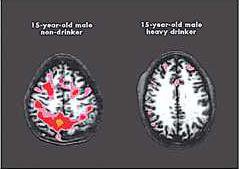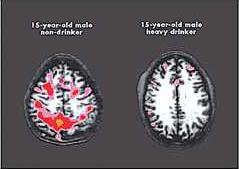0422medicalaud
Pharmacy assistant professor Merrill Norton describes how substance abuse affects the developing brain.This is your brain on drugs.
No, really.
Merrill Norton, a clinical assistant professor of pharmacy at the University of Georgia, spends part of his time traveling around the country and giving a PowerPoint presentation on how substance abuse affects brain development.
He shows graphic slides of positron emission tomography, or PET scans, which provide a map of energy consumption within the brain. In the brains of longtime drug abusers, the pattern is all out of whack, and certain parts of the brain appear atrophied.
Norton said what’s scary about teen drug use is that it occurs while the brain is still developing.
"What most people don’t know is that the human brain doesn’t fully mature (biochemically) until the ages of 24 to 26," he said.
"At age 11 or 12, before puberty, there’s only about 50 percent of the neurochemicals needed to make the brain work properly," Norton said. "At age 18, it’s about 75 percent."
That doesn’t mean children are mentally deficient. But their level of thinking is not as sophisticated as an adult’s.
"The part of the brain that handles decision-making is not fully mature," he said.
When a teen starts using drugs or alcohol, it literally creates a case of arrested development. Norton said the brain remains stuck at the level of maturity it was when drug use began.
"The theory is if they stop (using drugs) soon enough (before age 24 or so), there’s enough time for the brain to catch up," he said.
But in reality, few people are able to beat addiction that quickly. So drug users are left permanently stunted.
Norton calls it "the hijacking of the adolescent brain."
"Damage can start within a few months of starting substance abuse," he said. "The younger you are, the more vulnerable you become. And if you have a predisposition to or already have a mental illness, (substance abuse) will make it worse."
The consequences to society are staggering.
"I’d say of the people who drop out of high school, 80 percent are abusing drugs or alcohol," Norton said. "It affects their ability to learn, plan and make decisions. It also leads to crime, because adolescents lose their ‘braking’ ability, their inhibition against violence."
Without the capacity to plan for the future or exercise good judgment, most drug addicts get stuck in dead-end jobs, if they can find employment at all.
"Most end up in jails or institutions, or die prematurely," Norton said. "You rarely see any old addicts, because few live beyond 50."
Dr. Jeff Black, a psychiatrist with Laurelwood at Northeast Georgia Medical Center, said the brain isn’t the only organ affected by substance abuse.
"Over time, drugs can cause damage to the heart, liver and kidneys," he said.
But changes in the brain can occur surprisingly quickly.
"Substance abuse speeds up the aging of the brain," said Norton. "A (drug-using) 18-year-old may have the same (shrinking) brain volume as a 40-year-old. And there’s no medicine that will reverse that."
He said that while any drug can affect the brain, it seems that none is more toxic than methamphetamine. The drug is already well known for causing drastic changes in physical appearance, such as rotting teeth and sallow skin.
But the devastation that meth creates within the brain is even more worrisome.
"Meth raises body temperature and dehydrates cell membranes, which kills brain cells," Norton said. "After six months of meth use, the brain of a teenager can look very much like the brain of an Alzheimer’s patient."

